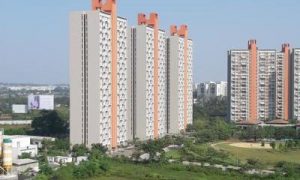The 2nd wave of Covid-19 has been much worse than the 1st one. The real estate sector has seen a change over the past few months owing to the dynamics of the pandemic. Real estate experts have various opinions on the impact of 2nd wave on the sector.
“While the number of visits to our project site offices have reduced due to the Covid regulations, we are noticing that the visitors that we do get are genuine end users looking to invest in a home. As a result, closures are occurring at a much faster pace than they did in pre-covid times. Home buyers are also taking advantage of home loan interest rates currently being at their lowest. Post the first wave of the pandemic, our teams have been working on floor plans and designs to ensure the efficient utilization of space. While it is easy to say that buyers want larger spaces, in reality, affordability constraints make it necessary to have efficiency in design. Ensuring that homes are multi-functional, have dedicated workspaces and have silent zones or relaxation areas are very important features to include in the homes we build today. In addition, developing communities with a plethora of amenities including open green spaces, activity spaces, work pods and Wi-Fi enabled zones, has now become extremely important. Given our learnings from this pandemic, going forward it would be fruitful if the planning authorities insist upon a certain amount of commercial space for daily essentials and a medical clinic for residential projects that are larger than 100 units as it would be beneficial for the residents,” says Shankar Sastri, Joint MD, Sterling Developers Pvt. Ltd.
“The demand for luxury holiday homes has always been high and has gone up in the post-COVID-19 context. As the second wave of the pandemic continues to rage across the country, the enquiries for second homes continue to be robust and the thrust is on wellness and greenery. These are times that will witness the emergence of projects that are product-centric and self-sustainable. With work from home being the new norm, geography is no longer a constraint and hence the need for a perfect work-life balance has fuelled the concept of a second home among corporate professionals too. The pandemic has triggered the need to buy a second home which down the line may become your first home. What was once an aspirational ‘want’ is now emerging as a ‘need’ for a safe and secure home and sensible real estate investment. The wake of the ongoing global pandemic coupled with growing health and wellness concerns has pivoted people’s focus’ towards buying spacious holiday homes. Hence, the desire to have bigger spaces for the same investment would definitely shift focus from buying realty in cities to second homes in holiday destinations. Goa will definitely attract investors because of its culture, lifestyle and the value for money it offers. Owning a luxury holiday home in Goa is also an increasing trend for buyers who look at it as luxury-living and also as a good investment option with better rental yields. The exposure to avant-garde lifestyle and the rise in HNIs have also fuelled the demand for luxury holiday homes in recent times. Today, people want ready-to-move-in homes that they can occupy immediately. Buyers are preferring houses in peaceful locations, where they can enjoy nature far away from the hustles and bustles of cities. People are looking for an abode that provide them with opportunities to rejuvenate, re-energise, unwind and relax. We’re at the start of a fundamental shift. The sooner we relate to it, the better off we will be. Although the future won’t look anything like today, we are that certain that leading developers and homebuyers will jointly reshape the luxury residential landscape for the good. With everyone banking on a sharp V-shaped recovery with the provision of the vaccine, 2021 is poised to be a strong one for holiday home transactions, ” Lindsay Bernard Rodrigues, Co-Founder and Director, Bennet & Bernard Group.
“The office market was showing a healthy recovery in the last few months. However, the second wave of COVID and the resultant mobility restrictions and possible lockdowns in some cities have adversely impacted office occupancy levels. While work from home may co-exist, but office space will not lose its importance. Despite being popular during the pandemic, work from home can’t outweigh the benefits of working in a physical office space, both in terms of cohesion as well as productivity. Medium-to-long-term fundamentals remain sound as corporate occupiers seek out alternative options to reduce costs and capital expenditure. As a result, even the most conventional occupiers are now seeing merit in coworking. Now, more than ever, flexibility is crucial and hence coworking spaces, with their natural flexibility and inherent readiness to add value are best positioned to adapt and redefine the future of workspace. Companies will strive to be agile and prefer to build more flexibility into their real estate portfolios. The potential demand compression from likely increased work from home (WFH) will be offset by increased demand from de-densification of offices, keeping demand robust. The pandemic has evolved us from just being workspace providers to becoming a fully integrated workspace solutions platform for clients. The coworking industry will play a very important role in the rebuilding of this economy, and we look forward to being a part of that, ” Manas Mehrotra, Founder, 315Work Avenue.
“After the second wave of pandemic, demand will be subdued for atleast 6 months. Developers in commercial realty will focus on Built-to-suit (BTS) model for their clients. As tenants look to consolidate cost and office footprint reduction, offices will adopt the hub and spoke model with seamless integration, which will bring tier-2 cities into limelight. The space requirement per person will increase significantly , which is a silver lining for existing supply of office space. The new age companies in digital space across sectors will be seen occupying higher space. There may be slight slow absorption for some more time, atleast till the vaccination drive is completed for large portion of India’s population, ” Riaz Maniyar, Co-founder, YieldAsset Real Estate Tech Pvt Ltd.





































